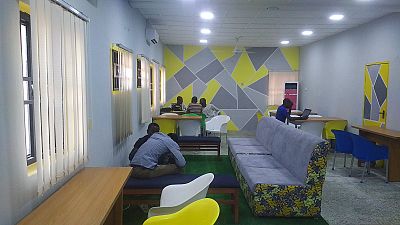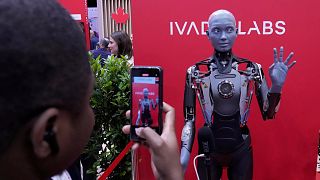Technology
CoLab Nigeria is a hub for tech enthusiasts and entrepreneurs to share a space where they can access the things that a developer needs – internet connection, electricity and a variety of minds all thinking of solutions to everyday social and technological problems.
Ifeanyi Mora is a regular at CoLab. He is working on an app that will help schools gather and manage their records.
“I don’t need to think of things I need to run like power and all what not. So it provides the space, it provides you know things I need to use like power and all that. And I said above all, you have people, people who have sort of the same skill set that you have that you can always mine from and share so that’s… it has been so helpful,” said Mora.
There are many spaces like these around the world and a growing number in Africa – where nearly 90 technology hubs and research bases often funded by international firms such as Microsoft, Google and Intel, incubate early-stage firms in cities like Lagos, Johannesburg, Nairobi and Addis Ababa.
Kaduna, in Nigeria’s north western state is a hub for trade and transport – a former industrial heartland that processed textile and petroleum products as well as being home to farming communities and cattle herders.
CoLab founder, Sanusi Ismaila wants this space – launched just last year, to open up the state’s economy and draw investment for tech entrepreneurs and start-ups.
“Basically, what we are trying to do is get more people into co-working, get more people into technology because we feel like technology is one of the single biggest ways to get more people across the poverty line and especially here in this part of the country, so you know we are investing in that and we feel like where we are based now, which is Kaduna has everything that a tech ecosystem needs to flourish. It just needs a push and you know we are at that push hoping to build a whole technology ecosystem here that can you know serve other parts of the world. Build technology solutions to some of the problems that are acute here,” he said.
CoLab offers training sessions on business and access to mentors and workshops to help local entrepreneurs develop their skills.
It is also just a cool place to hang out.
Youth unemployment is a massive problem in Nigeria, official figures show up to one in two young people are out of work.
“This is one of our work spaces, it’s the weekend so during weekends we do what we call down time. Which is pretty much, come play games, watch TV, chill, start interacting and it’s open to everyone not just people from CoLab. So, we sought of have an avenue for people to interact with the people that are here and you know basically rub off each other. Get more people outside to come in and understand what we are doing, and also get user feedback on some of the things that we are working on,” said Sanusi.
“Here… so when you are working or when you are … if you know are interested in books and stuff, we have a bunch of books – a lot of them fiction,” said Sanusi.
“We have a couple of Kindles here which have Amazon accounts so pretty much any book you want, makes it easy for us because it’s… you can pretty much get anything and you don’t need to keep buying stuff,” added Sanusi.
CoLab rents space out to members for between 3,100 naira (10 US dollars) and 10,500 naira (35 US dollars) a month. It can accommodate 100 people at full capacity in its indoor and outdoor areas.
Sanusi says the shared space and incubation concept is taking time to catch on in Kaduna.
“We have found a bunch of really smart people, you know, that can do really wonderful stuff but a lot of them basically see it as a hobby and not like something they can earn a living off you know, because of the prevailing culture and mindset so it’s one of the biggest challenges – changing people’s mindsets really and also getting people used to co-working. We have also a cultural of problem here because everyone is sought of like siloed and you know is used to working on his own and doing everything for himself,” said Sanusi.
Similar spaces in the capital Abuja and the second city Lagos, have helped many young people launch into tech business in Nigeria, home of Africa Internet Group (AIG), which owns several technology firms across 26 African countries including online retailer Jumia, delivery app HelloFood, hotel booking platform Jovago and online real estate marketplace Lamudi.














Go to video
“I can’t do nuttin’ for ya man”, Nigerian Minister quotes Flavour Flav in rejection of Trump policy
11:17
Bridging the legal gap in Africa’s digital boom {Business Africa}
00:55
Nigerian security forces kill 30 gunmen in counter-attack in northwest
Go to video
U.S. slashes visa duration for some African nationals amid policy shift
Go to video
Nigeria snubbed at White House summit, opposition blames Tinubu
02:05
WAFCON: Super Falcons fans optimistic about the team's performance